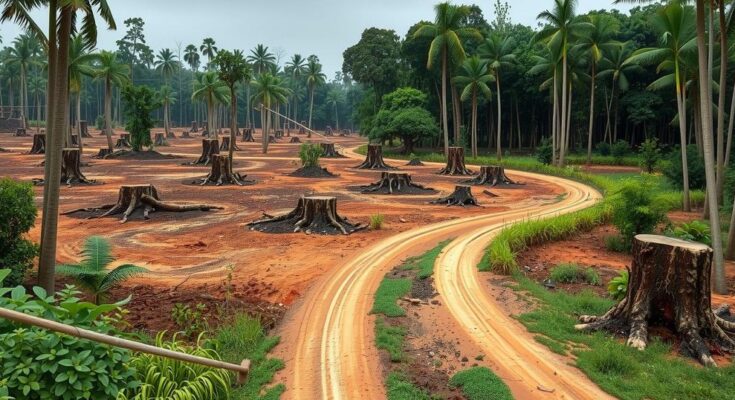Brazil is constructing a highway through the Amazon, raising significant concerns about deforestation and its impact on local wildlife and the environment. This project comes just months before the COP30 climate summit, prompting fierce criticism for contradicting the summit’s purposes. Locals, including açaí harvester Claudio Verrequete, have lost their livelihoods without compensation, while scientists warn of the highway’s harmful effects on the ecosystem.
Brazil is currently constructing a new four-lane highway through the Amazon rainforest in Belem, a move that has ignited considerable outrage among locals and environmentalists. This project, intended to ease traffic congestion for the upcoming COP30 climate summit, is particularly controversial given the timing, as it involves clearing thousands of acres of vital ecosystem, with serious implications for wildlife and the environment.
The highway, which covers over eight miles, is claimed by the state government to be a form of sustainable development. However, many critics argue that this destruction directly contradicts the aims of the climate conference, which seeks to highlight and mitigate the effects of climate change. The Amazon, recognized for its essential role in carbon dioxide absorption and biodiversity support, is being severely impacted by this project.
Reports reveal the devastation along the construction path, where felled trees and logs are conspicuous on what was once thriving forest land. Claudio Verrequete, a local resident and açaí berry harvester, has lost his source of livelihood due to the destruction, receiving no compensation and fearing further encroachment on the land that his community relies upon.
The highway is also drawing attention from scientists, who express concern that it will fragment crucial wildlife habitats, impeding animal migration. Professor Silvia Sardinha, a wildlife doctor, has documented injuries to animals caused by vehicles, exemplifying the negative impact human encroachment has on wildlife.
Ultimately, this roadway undermines Brazil’s position as a host for a climate summit, as it raises fundamental questions about the nation’s commitment to combating deforestation and fostering environmental sustainability.
In conclusion, the construction of a highway through the Amazon rainforest in Brazil poses significant threats to the environment, local livelihoods, and wildlife. Despite government claims of sustainable development, the disruption to this critical ecosystem highlights a stark contradiction to the goals of the upcoming COP30 climate summit. The project’s ramifications underline the urgent need for consistent and genuine environmental policies to protect vital ecosystems such as the Amazon.
Original Source: www.news18.com




